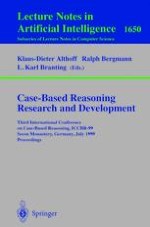1999 | OriginalPaper | Buchkapitel
When Experience is Wrong: Examining CBR for Changing Tasks and Environments⋆
verfasst von : David B. Leake, David C. Wilson
Erschienen in: Case-Based Reasoning Research and Development
Verlag: Springer Berlin Heidelberg
Enthalten in: Professional Book Archive
Aktivieren Sie unsere intelligente Suche, um passende Fachinhalte oder Patente zu finden.
Wählen Sie Textabschnitte aus um mit Künstlicher Intelligenz passenden Patente zu finden. powered by
Markieren Sie Textabschnitte, um KI-gestützt weitere passende Inhalte zu finden. powered by
Case-based problem-solving systems reason and learn from experiences, building up case libraries of problems and solutions to guide future reasoning. The expected benefits of this learning process depend on two types of regularity: (1) problem-solution regularity, the relationship between problem-to-problem and solution-to-solution similarity measures that assures that solutions to similar prior problems are a useful starting point for solving similar current problems, and (2) problem-distribution regularity, the relationship between old and new problems that assures that the case library will contain cases similar to the new problems it encounters. Unfortunately, these types of regularity are not assured. Even in contexts for which initial regularity is sufficient, problems may arise if a system’s users, tasks, or external environment change over time. This paper defines criteria for assessing the two types of regularity, discusses how the definitions may be used to assess the need for case-base maintenance, and suggests maintenance approaches for responding to those needs. In particular, it discusses the role of analysis of performance over time in responding to environmental changes.
